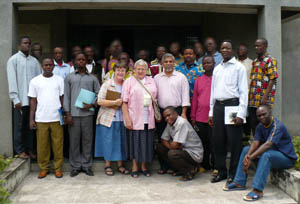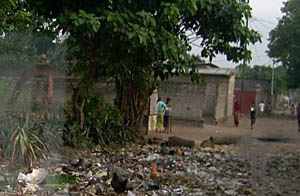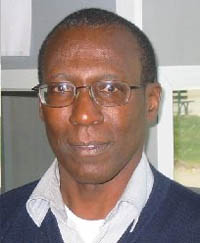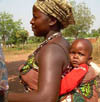


Call to Justice |
To open a PDF document, you need Adobe Acrobat Reader,Click the icon follow the prompts. It is free, safe and secure.
The
Cradle of Humankind: A Challenge to Solidarity Her name is Clementine. From her size, I estimated that she was about 4 or 5 years of age. On her dark brown skin, a crusty, black, scab-like condition was continuing to spread. Although the day was warm, she wore a dirty windbreaker with the hood up over her head to cover the signs of the disease on the sides of her face. The jacket’s long sleeves covered her arms for the same reason. Her eyes were clouded gray but she seemed to be able to see us. Her disease remains undiagnosed. We learned that she is in fact 15 years old and that all those in her immediate family are dead. In 1994 -- the year of the Rwandan genocide -- she would have been an infant. She now lives with an aunt who struggles to feed Clementine as well as her own children. In the same hospital ward with Clementine, we met a woman with one leg, forced to walk stooped-over on crutches too short for her tall frame. We learned that she lost her leg to a landmine. She has two young sons. The younger of the two (perhaps 3 or 4 years of age) is so malnourished that his spindly little legs cannot support his torso. He moves around, “walking” on both his hands and feet to support himself -- his skinny, bare bottom up higher than his head. As is the norm, the hospital does not provide food for any of the patients. Unless family or friends bring meals, patients go without food. The next closest hospital is in Kigali, an hour and a half drive through the mountains.
Rwanda is home to more than 10 million people. During the first 100 days of the 1994 genocide, more than 800,000 people were brutally killed. That means on average 8,000 people were slaughtered every day for 100 days. In addition, the UN estimates that between 250,000 and 500,000 women were raped during that period. The nations of the world failed to act to stop the genocide.
We traveled to Rwanda at the invitation of
Dominican Sisters Africa who are celebrating their tenth anniversary
as a collaborative movement. This third tri-annual assembly of
DSA was a gathering of hope. About 30 Sisters representing 19 Dominican congregations
serving in Africa gathered from 16 countries around the theme: “Dominican
Women Working Together to Enhance Our Mission and Rediscover Our
Richness and Diversity.” Some of these Sisters have
endured horrendous personal tragedies. Many come from areas
in great conflict. Others serve people in unimaginable poverty. But,
amazingly enough, they maintain their Gospel confidence. There
were many expressions of appreciation for Dominican Sisters International. This
was especially true for the DSI Solidarity Fund which has made
many programs and services available to Dominican Sisters in Africa.
In Congo-Kinshasa, the impression that stays with me is that of a city of 10-million people with neighborhoods of unimaginable poverty where houses are tacked together from pieces of corrugated aluminum, cardboard, wood and mud bricks. Rutted dirt roads are cluttered with years of uncollected garbage. The DRC is almost one-fourth the size of the US with more than 66.5 million people. Its citizens have never had an opportunity to vote for government officials. During the most recent interstate war, 3.8 million people died there between 1998 and 2004. That is an average of more than 1,500 people dying every day for seven years. Where was the rest of the world? I ask myself, what was I doing during those years that left me unaware of a tragedy on this scale?
Africa is the world's second-largest and second most-populous continent, after Asia. At about 11.7 million sq mi., including adjacent islands, it covers six percent of the Earth's total surface area and about 20 percent of the total land area. With more than 922 million people in 61 territories (53 countries; 8 dependencies), it accounts for about 14percent of the world's human population. Africa, particularly central eastern Africa, is widely regarded within the scientific community to be the place where humans originated – with the earliest Homo sapiens (human) remains found in Ethiopia and dated to about 200,000 years ago. Dominicans (Friars, Sisters, Nuns, Laity) live and minister in 30 countries of the African continent, in five regions:
Sub-Saharan Africa is a geographical term
used to describe those African
countries which are fully or partially located south
of the Sahara Desert. It contrasts with North
Africa, which is part of the Arab
world. The Horn
of Africa and Southern
Sudan are technically part of Sub-Saharan Africa,
but nevertheless have Islamic influence.
Generally, sub-Saharan Africa is the poorest region in the
world, suffering from the effects of colonialism, economic
mismanagement, local corruption and inter-ethnic conflict.
The region contains many of the “least
developed countries” in the world. Emmanuel also pointed-out that Africa offers every opportunity for a very attractive market in weapons trafficking and that there is nothing to indicate that those countries that benefit from this industry are willing to let Africa become stable. He said that there is evidence that even Church organizations have shareholder investments in companies that are involved in such trafficking. He challenged us with the observation that there are many Dominicans in the countries whose governments and corporations supply weapons to the various parties in conflict in Africa. Emmanuel emphasized that while Dominicans “on the ground” in Africa may be working very hard to address critical, local, human problems, the causes of those problems may have their origins in economic, social and political systems operating far beyond the African continent. Dominicans in Africa -- and throughout the entire world – must master the techniques of social analysis as well as a deepening of theology if the truth of our world reality is going to be seriously considered. The phrase, the burden of knowing, has been used in a variety of contexts. It captures for me the ongoing challenge of these brief visits to the African continent. What do I do with what I’ve learned? How do I integrate such an experience into my soul? How do I avoid the temptation to excise from my memory the incidents of our terrible inhumanity to one another? One of the Millennium Development Goals is to “Develop a global partnership for development.” Both the 2007 Assembly of Dominican Sisters International and the 2008 General Chapter of Bogotá called Dominicans to promote and implement this goal as well as the other MDGs. The worldwide Dominican Family provides for us a ready-made structure for “global partnership.” We have that advantage. We are challenged to continue to learn about our global Family and to strengthen our relationships. Truth about our world reality must shape our understanding of the meaning of authentic “development.” This same truth must inform efforts to guarantee the right to this authentic development for all peoples. With our global relationships, we have a unique opportunity as Dominicans to strengthen our solidarity: “least developed” with “developed;” “North” with “South;” “East” with “West;” and between and among all the separating categories in which we find ourselves.
Dominicans living and ministering in the most
desperate places on Earth, please know that you are not abandoned. Your
Dominican Sisters and Brothers in other parts of the world stand
in admiration of your efforts to create a more compassionate
and just world and want to be in solidarity with you. Dominicans
living and ministering in the “developed countries” whose
policies have much to do with the systems that structure injustice
in the “least
developed countries,” we cannot permit ourselves simply
to dismiss desperate parts of the world as areas beyond our influence. We
cannot live pretending that we do not know or convinced that we
are powerless. Let us put our minds together and respond. Let
us pray with our Sister Catherine of Siena that God will always
trouble us with a “holy discontent.” Some data from Wikipedia sources, photo source: Toni Harris, OP |
"Unless family or friends bring meals, patients go without food."
..."How do I avoid the temptation to excise
from my memory the incidents of our terrible inhumanity to one
another?"
|
 Home | Contact Us | DLC Dominican Life | USA is sponsored by the Dominican Leadership Conference, the networking organization for elected leaders in the USA. Dominican Life | USA © 2002-2007, All Rights Reserved Web Editor: Anne Lythgoe, OP |
|---|
 Rwanda is slightly smaller than Maryland in
the USA. It is a beautiful land. Tourism materials describe it
as a tropical Switzerland. It
is known as the land of a thousand hills. (“Hotel Des Milles
Collines” is the actual name of the hotel from the film, Hotel
Rwanda. This hotel continues to operate in Kigali.) Rwanda
seems to have endless hills and valleys covered with lush flora
and fauna (thus the story and setting for another film, Gorillas
in the Mist). Given Rwanda’s relatively high altitude
(Kigali at 4800 ft), the temperature is comfortable.
Rwanda is slightly smaller than Maryland in
the USA. It is a beautiful land. Tourism materials describe it
as a tropical Switzerland. It
is known as the land of a thousand hills. (“Hotel Des Milles
Collines” is the actual name of the hotel from the film, Hotel
Rwanda. This hotel continues to operate in Kigali.) Rwanda
seems to have endless hills and valleys covered with lush flora
and fauna (thus the story and setting for another film, Gorillas
in the Mist). Given Rwanda’s relatively high altitude
(Kigali at 4800 ft), the temperature is comfortable. 
 In Nairobi, Kenya, I cannot forget our Dominican Nuns dancing
to the Magnificat that we sang together at Vespers. Our Brothers
in Nairobi were most hospitable. We met some of our Sisters and
Laity, as well. However, I reflect with sadness that the city of
Nairobi, which effectively welcomed more than 80,000 people for
the World Social Forum in January 2007, was sufficiently fragile
enough to be thrown into conflict and upheaval only one year later
because of disputed elections. Kenya is slightly more than twice
the size of Nevada and is home to nearly 38 million people.
In Nairobi, Kenya, I cannot forget our Dominican Nuns dancing
to the Magnificat that we sang together at Vespers. Our Brothers
in Nairobi were most hospitable. We met some of our Sisters and
Laity, as well. However, I reflect with sadness that the city of
Nairobi, which effectively welcomed more than 80,000 people for
the World Social Forum in January 2007, was sufficiently fragile
enough to be thrown into conflict and upheaval only one year later
because of disputed elections. Kenya is slightly more than twice
the size of Nevada and is home to nearly 38 million people. An image in the Central African Republic that
remains with me is that of men pushing their burdened, wheeled
carts along the roads. Each small cart balanced a large number
of tree branches, trunks and other pieces of wood piled and tied
together in long, narrow loads that stretched out 20 to 30 feet.
They call this piled wood on wheels a "jaguar." (The long, sleek shape
of the stacked wood probably could be compared to a jaguar running.)
This heavy load propelled slowly forward by a man throwing all
his weight into moving his burden down the road is an apt metaphor
for the each person’s struggle to survive another day there. I
was deeply moved by the plea of Gianna Masera OP (JP Co-Promoter
for Africa) that we work to make the Dominican world aware of the
African reality -- especially for women and children, more
and more the first victims of war. CAR is slightly
smaller than Texas with a population of less than 4.5million people.
An image in the Central African Republic that
remains with me is that of men pushing their burdened, wheeled
carts along the roads. Each small cart balanced a large number
of tree branches, trunks and other pieces of wood piled and tied
together in long, narrow loads that stretched out 20 to 30 feet.
They call this piled wood on wheels a "jaguar." (The long, sleek shape
of the stacked wood probably could be compared to a jaguar running.)
This heavy load propelled slowly forward by a man throwing all
his weight into moving his burden down the road is an apt metaphor
for the each person’s struggle to survive another day there. I
was deeply moved by the plea of Gianna Masera OP (JP Co-Promoter
for Africa) that we work to make the Dominican world aware of the
African reality -- especially for women and children, more
and more the first victims of war. CAR is slightly
smaller than Texas with a population of less than 4.5million people.  In Cameroon, I remember the miracle of the new St. Martin de Porres
Health Center, a collaborative project of five congregations of
Dominican Sisters, built to serve people in an area of extreme
poverty in Yaoundé. Cameroon is slightly larger than California,
with a population nearly 18.5 million people. The Sisters there
gather every year between Christmas and New Year’s to focus
on matters of justice and peace. I also recall our witnessing
in Cameroon ongoing deforestation: many, 16-wheel flatbed trucks
on the highway, each one hauling five or six huge trunks of virgin
timber (each trunk about thirty feet long and 8-10 feet in diameter)
to the port for shipment out of the country.
In Cameroon, I remember the miracle of the new St. Martin de Porres
Health Center, a collaborative project of five congregations of
Dominican Sisters, built to serve people in an area of extreme
poverty in Yaoundé. Cameroon is slightly larger than California,
with a population nearly 18.5 million people. The Sisters there
gather every year between Christmas and New Year’s to focus
on matters of justice and peace. I also recall our witnessing
in Cameroon ongoing deforestation: many, 16-wheel flatbed trucks
on the highway, each one hauling five or six huge trunks of virgin
timber (each trunk about thirty feet long and 8-10 feet in diameter)
to the port for shipment out of the country.  On first hearing, it may sound very exciting
to have visited five countries in Africa. And it was. It was a privilege. But
the resulting problem for me is what to do with the experience
and the learnings from those travels. Sharing information that
serves only to make people in the so-called “least developed
countries” feel as though there is nothing hopeful or positive
in their countries is demeaning. Sharing information that
serves only to make people in the so-called “developed countries” feel
guilty about the disparity between the North and the South is not
particularly effective. So, what do we do? My words
feel hollow in the face of the reality but I am determined to somehow
carve them out.
On first hearing, it may sound very exciting
to have visited five countries in Africa. And it was. It was a privilege. But
the resulting problem for me is what to do with the experience
and the learnings from those travels. Sharing information that
serves only to make people in the so-called “least developed
countries” feel as though there is nothing hopeful or positive
in their countries is demeaning. Sharing information that
serves only to make people in the so-called “developed countries” feel
guilty about the disparity between the North and the South is not
particularly effective. So, what do we do? My words
feel hollow in the face of the reality but I am determined to somehow
carve them out. Our Brother Emmanuel Ntakarutimana OP (Burundi), who addressed
the DSA Assembly, stated that almost 50% of the countries in
Africa have been in situations of open warfare during recent
years, with new the phenomena of armies without borders, child
soldiers, rape as a weapon of war, large scale massacres, ethnic
cleansing or genocide. And the resulting displacement of populations
makes African Peoples more than half of the world’s refugees.
Our Brother Emmanuel Ntakarutimana OP (Burundi), who addressed
the DSA Assembly, stated that almost 50% of the countries in
Africa have been in situations of open warfare during recent
years, with new the phenomena of armies without borders, child
soldiers, rape as a weapon of war, large scale massacres, ethnic
cleansing or genocide. And the resulting displacement of populations
makes African Peoples more than half of the world’s refugees. 
